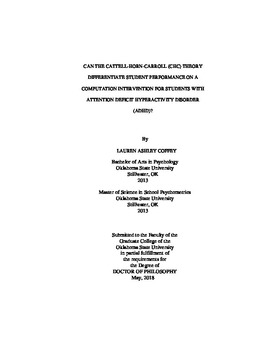| dc.contributor.advisor | Poncy, Brian | |
| dc.contributor.author | Coffey, Lauren Ashley | |
| dc.date.accessioned | 2019-03-25T21:59:31Z | |
| dc.date.available | 2019-03-25T21:59:31Z | |
| dc.date.issued | 2018-05 | |
| dc.identifier.uri | https://hdl.handle.net/11244/317767 | |
| dc.description.abstract | Students with attention-deficit/hyperactivity disorder (ADHD) often have difficulties in school related to behavior and academics. Math achievement continues to be a major concern, with approximately five to eight percent of school-aged children having diagnosed deficits in math achievement. This does not account for school-aged students who are struggling in mathematics. Though there is a high comorbidity rate between ADHD and Specific Learning Disabilities (SLD), little research has been done on examining fluency-based interventions with students who have ADHD. In addition, diagnoses are just labels and do not currently provide treatment options regarding interventions that take into account specific deficits or impairments. If assessments are going to continue to be used, researchers need to work towards identifying ways these tools can be more effective in not only facilitating problem identification, but also intervention development. The current study compared students with ADHD to typically developing students regarding their performance on a Taped Problems intervention to determine whether differing time-delay procedures influenced learning rates. The CHC factors from the WJ III COG were used to match cognitive profiles for students with a diagnosis of ADHD. Results confirmed that the Taped Problems (TP) intervention was effective in increasing math fact fluency for both groups. Specifically, both treatment conditions were equally effective for students without ADHD when compared to the control group; however, for students with ADHD, the 2-s time delay condition was found to be most effective. These results provide evidence for utilizing assessment data to inform evidence-based treatment options. | |
| dc.format | application/pdf | |
| dc.language | en_US | |
| dc.rights | Copyright is held by the author who has granted the Oklahoma State University Library the non-exclusive right to share this material in its institutional repository. Contact Digital Library Services at lib-dls@okstate.edu or 405-744-9161 for the permission policy on the use, reproduction or distribution of this material. | |
| dc.title | Can the Cattell-Horn-Carroll (CHC) theory differentiate student performance on a computation intervention for students with Attention Deficit Hyperactivity Disorder (ADHD)? | |
| dc.contributor.committeeMember | Stinnett, Terry | |
| dc.contributor.committeeMember | Duhon, Gary | |
| dc.contributor.committeeMember | Mwavita, Mwarumba | |
| osu.filename | Coffey_okstate_0664D_15738.pdf | |
| osu.accesstype | Open Access | |
| dc.type.genre | Dissertation | |
| dc.type.material | Text | |
| thesis.degree.discipline | Educational Psychology | |
| thesis.degree.grantor | Oklahoma State University | |
